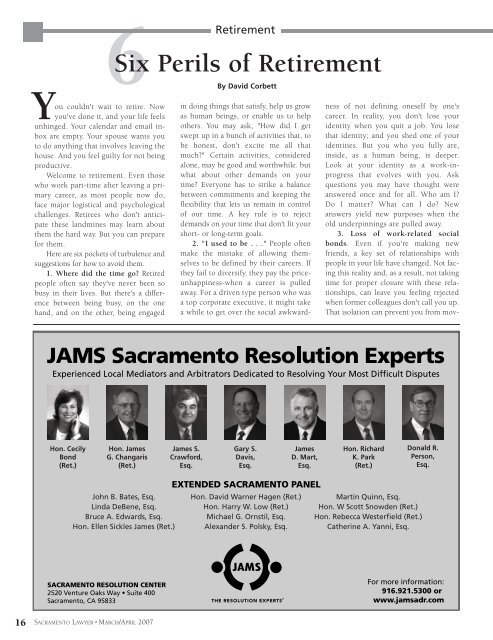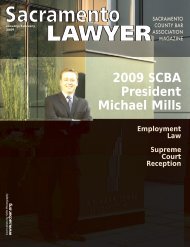March / April 2007 - Sacramento County Bar Association
March / April 2007 - Sacramento County Bar Association
March / April 2007 - Sacramento County Bar Association
Create successful ePaper yourself
Turn your PDF publications into a flip-book with our unique Google optimized e-Paper software.
You couldn't wait to retire. Now<br />
you've done it, and your life feels<br />
unhinged. Your calendar and email inbox<br />
are empty. Your spouse wants you<br />
to do anything that involves leaving the<br />
house. And you feel guilty for not being<br />
productive.<br />
Welcome to retirement. Even those<br />
who work part-time after leaving a primary<br />
career, as most people now do,<br />
face major logistical and psychological<br />
challenges. Retirees who don't anticipate<br />
these landmines may learn about<br />
them the hard way. But you can prepare<br />
for them.<br />
Here are six pockets of turbulence and<br />
suggestions for how to avoid them.<br />
1. Where did the time go? Retired<br />
people often say they've never been so<br />
busy in their lives. But there's a difference<br />
between being busy, on the one<br />
hand, and on the other, being engaged<br />
16 SACRAMENTO LAWYER ■ MARCH/APRIL <strong>2007</strong><br />
6<br />
Retirement<br />
Six Perils of Retirement<br />
By David Corbett<br />
in doing things that satisfy, help us grow<br />
as human beings, or enable us to help<br />
others. You may ask, "How did I get<br />
swept up in a bunch of activities that, to<br />
be honest, don't excite me all that<br />
much?" Certain activities, considered<br />
alone, may be good and worthwhile. but<br />
what about other demands on your<br />
time? Everyone has to strike a balance<br />
between commitments and keeping the<br />
flexibility that lets us remain in control<br />
of our time. A key rule is to reject<br />
demands on your time that don't fit your<br />
short- or long-term goals.<br />
2. "I used to be . . ." People often<br />
make the mistake of allowing themselves<br />
to be defined by their careers. If<br />
they fail to diversify, they pay the priceunhappiness-when<br />
a career is pulled<br />
away. For a driven type person who was<br />
a top corporate executive, it might take<br />
a while to get over the social awkward-<br />
ness of not defining oneself by one's<br />
career. In reality, you don't lose your<br />
identity when you quit a job. You lose<br />
that identity; and you shed one of your<br />
identities. But you who you fully are,<br />
inside, as a human being, is deeper.<br />
Look at your identity as a work-inprogress<br />
that evolves with you. Ask<br />
questions you may have thought were<br />
answered once and for all. Who am I?<br />
Do I matter? What can I do? New<br />
answers yield new purposes when the<br />
old underpinnings are pulled away.<br />
3. Loss of work-related social<br />
bonds. Even if you're making new<br />
friends, a key set of relationships with<br />
people in your life have changed. Not facing<br />
this reality and, as a result, not taking<br />
time for proper closure with these relationships,<br />
can leave you feeling rejected<br />
when former colleagues don't call you up.<br />
That isolation can prevent you from mov-






